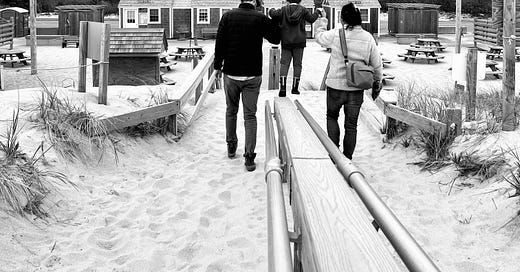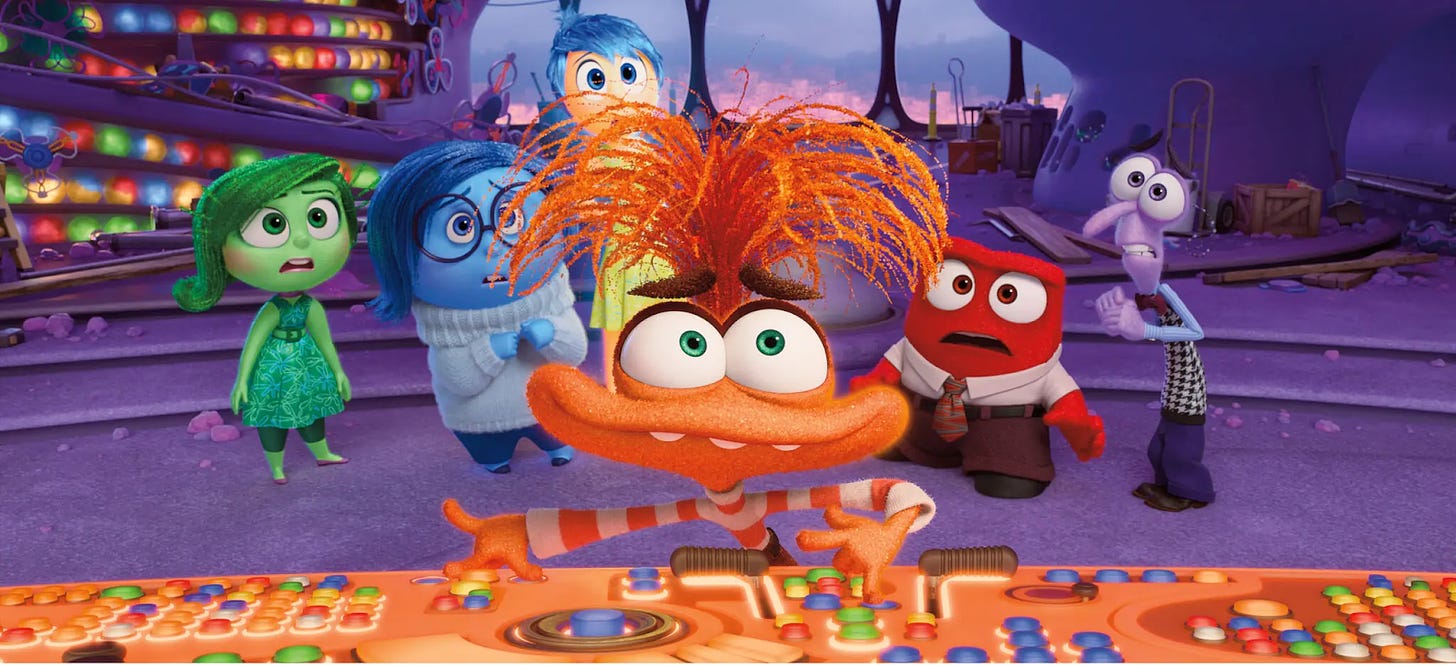Holding hands with Anxiety, as the election looms
Plus: resources from Brown University, mindfulness experts, and a certain Pixar movie
We are not our nervous system states. It’s so easy to identify with them – to think they’re who we are, rather than states we move through. We often dislike ourselves, feel ashamed, or feel worried when we feel anxious, stressed, despairing, craving, or afraid. [A]wareness helps us take these states less personally: this is just what nervous systems do.
— Karly Randolph Pitman
There is a reason why Inside Out 2 was the highest-grossing blockbuster hit of this past summer. That reason has a name. Her name is Anxiety.
(Warning: this post contains mild spoilers about Anxiety.)
Anxiety, in both the movie and in my own experience, separates us from a healthy sense of ourselves as empowered, capable and kind. She co-opts the imaginative powers of the human mind for nefarious purposes: instead of using them to dream up new ways to experience happiness and liberation, she uses them to manufacture an endless stream of “what-if” scenarios, from the eerily prescient to the highly improbable. She tells us that rest and relaxation are luxuries we can ill afford.
By the end of the movie, the rest of the emotions have accepted Anxiety as a helpful, if sometimes overly controlling, member of their team. They appreciate her ability to anticipate legitimate future obstacles, to sense current threats in the environment, and to form sophisticated strategies to respond to those things. (Fear, in particular, is a fan of all that.)
Emotions like Joy and Sadness also help Anxiety to understand that sometimes, human brains need connection, pleasure, presence, and just plain sleep, just as much as they need an airtight ten-point plan. They remind us that Anxiety is simply one emotion among many, something we feel, not an unstoppable entity that gets to decide who we are.
As the U.S. election looms, my own version of Anxiety is locked in a mental battle with a certain other orange-tinged entity that keeps many of us awake at night. Yet other parts of me are trying to remind her that using language to denigrate or villainize others’ appearances or identities, rather than using our intelligence to assess and take steps to avoid the negative consequences of their ideas, is not the behavior of an empowered, capable and kind person. Which is who, on my best days, I endeavor to be.
For me, the middle path between devolving into stark-raving daymares and tipping into delusional Pollyanna-land involves simply looking at the truth, as it is, moment to moment. It means gently allowing my wiser inner self, the part of me that can witness my emotions rather than becoming merged with them, to hold Anxiety’s hand in the present, rather than letting her rip off my arm.
As I sit writing this, here is how this interaction sounds in my mind.
Anxiety: One possible election outcome tomorrow could have vastly scarier consequences than the other one. We need to make a plan!
Wise inner witness, taking Anxiety’s hand:
I hear that you’re scared.
It makes sense that you’re scared. You’ve been through a lot over the last decade, from pandemics to pregnancy loss, and politics at every level have had a lot to do with that.
It makes sense that your body would have a strong reaction to that. There it is, the whining headache between your eyebrows, the shallowing of the breath in the lungs, the heart rate ticking upwards, the tightening in the belly.
I’m here.
Here is what I can offer today: Those future consequences you’re imagining? They’re not here yet, in the present. Today, there is simply the uncertainty of the moment.
So let’s work with that uncertainty. Let’s bring our attention to the breath, and let it deepen. Let our breath fill our nostrils, and loosen the tightness lodged in the forehead. Let it fill the lungs, as you bring your hand to your own heart, letting it know that it’s surrounded with care, that no one is ignoring its fragile, fearful beat. Let the breath fill the belly, allowing moments of spaciousness to alternate with moments of contraction. Let the exhale carry our intentions to offer this same spaciousness to others who might need it, to let these breaths benefit all beings.
Anxiety: But how is that better than filling a large bunker with canned goods? How is all of this going to protect us from what might be coming next?
Wise inner witness: We protect ourselves and the people around us by ensuring we don’t add reactivity to what is already an uncertain situation, by lashing out from a place of fear or anger, which only invites others to lash back out at us. We allow ourselves to feel not only fear, but sadness, as Susan Piver advises here, and then choose more skillful actions from that tender-hearted place. We protect our families and communities by offering the contagious benefits of a well-tended nervous system to other people who are scared, instead of abandoning them in their moment of need or adding more momentum to their spiraling with our own.
In short: We balance preparing for the future with being present in the now. I know it is so hard to do this. You’re going to have to trust me.
Anxiety, squeezing my hand: Okay. Just for this next breath, I’ll try.
Wise inner witness: That’s all I can ask of you.
Further Reading:
If you’re having a similar inner freak-out this week, here are a few other things you can do:
Go inward. Consult your own inner team of emotions. Commit to discerning the difference between the real difficulties of this day and the endless what-ifs that will sap your energy and distract you from acting in alignment with your integrity, if you let them. Commit instead to being kind to yourself and others today. If you need a guided meditation to support you with this right now, I’ve got one for you here.
I also really love Tara Brach’s short talks on RAIN meditation (which inspired the dialogue with Anxiety above). RAIN stands for Recognizing, Allowing, Investigating and Nurturing ourselves when in the grip of strong emotions. Here’s a playlist of Tara Brach’s greatest-hits meditations along these lines.
Connect with mindful community. I wrote last week about how much easier it is for me to confront uncertainty and fear when I’m meditating alongside others. This is the power of sangha.
There are many mindfulness folks offering free community-based support along these lines, today and tomorrow. For example:
Kevin Townley is offering a pre-election meditation session tonight (Monday Nov. 4) at 6-7pm. Details here.
The good folks at the Mindfulness Center at Brown University are offering a free mindfulness webinar for working with election anxiety on Tuesday, Nov 5, at 12pm EST.
If you prefer a simpler Zoom link and sangha sit, Susan Piver is also offering this at 12pm EST.
In the evening of Nov 5, from 5:30-6pm,
will offer “a calming meditation class to ground yourself, cultivate presence, and find peace amidst the day’s intensity.”If you can’t make any of these times, Lodro has also opened up his extensive meditation library for a short time; details here. (Also recommended: Lodro’s take on Election Anxiety here, and more expansive thoughts on equanimity here, in a perfectly-titled post called “Everything Is Fucked / Everything Is OK.”
As for me: I’ll be meditating with and holding space for fellow perinatal loss survivors in the evening of Nov. 5 with RTZ Hope. While this is a closed group, you can indicate your interest in meditating with me and other caregivers in this community, in the months to come, via this form. You can also listen to our bodily-autonomy-themed playlist here.
Read stories of people like you who may be more impacted by these results than you, and allow them to touch your heart. For example, I have interviewed many people who have needed to access abortion-related care in order to survive complications related to planned and wanted pregnancies, and how that has played out for them in their communities. This list includes everyone from investigative reporters and NPR producers to hospital chaplains and therapists. Educate yourself about the realities of giving birth and ending pregnancies in America as reported out by the people experiencing those things, vs. what you may have been told by people who stand to benefit from twisting the truth to suit their political objectives. (As
writes here, this includes people on both sides of the political divide.) Then vote accordingly.Consider how your vote can be an act of allyship for people in your community, and not just a way to signal your political alignments (or lack thereof) with national candidates. For example, if reproductive justice matters to you, be sure to turn up if you live in these 10 states: Arizona, Colorado, Florida, Maryland, Missouri, Montana, Nebraska, Nevada, New York, and South Dakota. If you consider yourself an ally or activist for the queer community and you live in California, Colorado, Ohio or Hawai’i, it’s important to come prepared to the polls with information about these initiatives too.
Revisit the concept of Ring Theory — the idea that if someone is more impacted by an event than you are, you can do more than “check your privilege.” You can send real comfort into the center of the “ring” of impact. For example, someone you know may be planning the future of their family based on the outcome of tomorrow’s voting, and its implications for reproductive justice, IVF access, parental leave or subsidized childcare. Or they may be feeling extra targeted and unsafe due to their gender identity. Use the language here, and the examples of direct support I describe here, to acknowledge and hold space for their experience. See if you can support them in other more material ways (dropping off a pizza, hosting a playdate at your place), if they need to hide under the covers right now.
The corollary of this notion is the idea of “dumping out.” This means not asking your most vulnerable loved ones to hold hands with your anxiety, if they’re already overwhelmed with the task of tending their own. Instead, find someone who is less impacted than you, or who is paid, resourced and trained to offer support during times like this, and ask them for help instead. (If you are a cis, white, and/or hetero man, it may be especially helpful to read and reflect on this.)
If you have living children, help them to make sense of the adult anxiety all around them (after tending your own with the suggestions above). Telling kids the truth in developmentally appropriate ways is better, and ironically less anxiety-inducing, than disingenuously promising them that “It’s all going to be OK” through gritted teeth. This piece by
has great, actionable advice on how to do that.
Share your own thoughts in the comments about how you’re planning to stay sane and connected this week. I know that many of us can use them.





